-
IP addresses are NOT logged in this forum so there's no point asking. Please note that this forum is full of homophobes, racists, lunatics, schizophrenics & absolute nut jobs with a smattering of geniuses, Chinese chauvinists, Moderate Muslims and last but not least a couple of "know-it-alls" constantly sprouting their dubious wisdom. If you believe that content generated by unsavory characters might cause you offense PLEASE LEAVE NOW! Sammyboy Admin and Staff are not responsible for your hurt feelings should you choose to read any of the content here. The OTHER forum is HERE so please stop asking.
You are using an out of date browser. It may not display this or other websites correctly.
You should upgrade or use an alternative browser.
You should upgrade or use an alternative browser.
Fuck your racism accusations, fucking Indians!! THIS IS HEALTH!
- Thread starter Cottonmouth
- Start date
KNN although Scott attempted to be diplomatic about this my uncle still think Scott think that fucking shit skin is a parasite whether with or without covid KNN he should have been more honest to be direct about it as India should not have existed in the first place KNN but somehow my uncle think that mudland Indians could be worse or on par KNN
he is just calling a spade a spade
nothing racist
i wish our pap government have some guts to acknowledge facts like scotty
nothing racist
i wish our pap government have some guts to acknowledge facts like scotty
The truth hurts. Fucking Ah Nehs.
Once this Indian Covid strain explode x break loose here, who is to be blamed????
pap will say singkiesOnce this Indian Covid strain explode x break loose here, who is to be blamed????
confirm and double confirm
and like a herd of lost sheep, singkies will believe
no?
Once this Indian Covid strain explode x break loose here, who is to be blamed????
The contractors and/or cronies who made the Tracetogether tokens and SafeEntry Gateway pads are laughing all the way to the bank.
Those Govtech clowns think technology will save them from a virus.

You took the words right out of my mouth.he is just calling a spade a spade
nothing racist
i wish our pap government have some guts to acknowledge facts like scotty
Also, so what if it's racist? Nobody wants to go to their shithole country because everyone hates and do not trust indians. And yet they must come to our country. Knn!
what's so racist about this? this are facts man..
what's so racist about this? this are facts man..
It's not racist, but they love to relish in the victimhood of imaginary racism... that gives them the moral high ground.
Talk about the tyranny of the MINORITY....if the ah nehs gain more power.. kangaroo land is fucked
Coalition to hold talks with Indian-Australian community leaders as anger mounts over travel ban | Australian politics
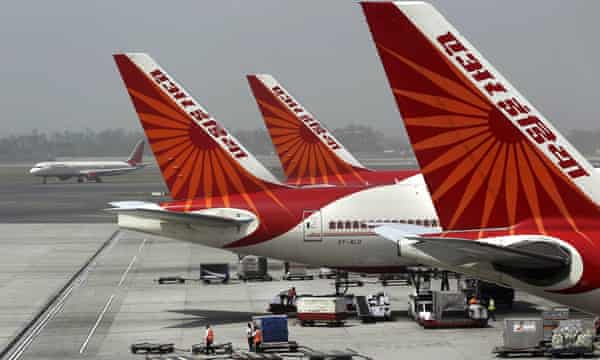 Coalition immigration minister Alex Hawke will meet Indian-Australian community leaders to discuss the travel ban that is blocking 9,000 people, including 650 who are considered vulnerable, from returning home. Photograph: Kevin Frayer/AP
Coalition immigration minister Alex Hawke will meet Indian-Australian community leaders to discuss the travel ban that is blocking 9,000 people, including 650 who are considered vulnerable, from returning home. Photograph: Kevin Frayer/AP
Morrison government is under increasing pressure to allow Indian Australians to return home
Sarah Martin Chief political reporter
Tue 4 May 2021 20.25 AEST
The immigration minister, Alex Hawke, will hold an urgent roundtable with Indian-Australian community leaders, as the government seeks to quell anger about the government’s widely-condemned India travel ban.
Amid mounting pressure over its hardline approach, including from within Coalition ranks, Hawke will meet community leaders on Wednesday to discuss the ban that is blocking 9,000 people, including 650 who are considered vulnerable, from returning to Australia.
As India’s Covid crisis worsens, the national security committee of cabinet will meet on Thursday to review the ban that criminalises the return to Australia of anyone who has been in India in the past 14 days, with the threat of up to five years’ jail.
The government is preparing to resume flights from the Covid-ravaged country when the midnight biosecurity determination put in place by the health minister Greg Hunt expires on 15 May.
However, there are also calls to begin repatriation flights earlier once the infection rate at the national quarantine facility at Howard Springs falls belows 2%. There are currently 35 positive people at the centre, but with only 330 people quarantining there, the infection rate is at 10.6%.
The government is also being pressured by Cricket Australia to come up with a solution to allow Australian cricketers playing in the now-cancelled Indian Premier League to return home.
Cabinet’s national security committee will make decisions on Thursday about how the government can best resume flights and how to approach the challenge of bringing as many as 9,000 people left in India home, many of whom are likely to be infected with Covid-19.
On one of the last flights to Australia from India before the ban was put in place, one in eight travellers tested positive to Covid.
About 650 of the 9,000 Australians stranded in India are considered vulnerable, but the Morrison government will insist that all Australians who are repatriated first test negative to two tests – both a Covid-19 Polymerase Chain Reaction (PCR) test result and a Rapid Antigen test.
On Monday, Hawke confirmed that a traveller will “need two separate negative tests to get on a plane” as the government seeks to keep a lid on the positive infection rate in the quarantine system.
The government is finalising arrangements with Qantas to be able to put the testing regime in place, however the government is understood to be less confident in the ability of Air India to do the same.
This means that any vulnerable Australian who tests positive will be left to seek help in India’s overburdened health system, which is on the brink of collapse as it tries to deal with the country’s Covid tragedy.
The Australian Medical Association president Omar Khorshid called on the government to use whatever means necessary to bring Australians in India home, particularly the 650 registered with the Department of Foreign Affairs as vulnerable.
“The government, in our view, should be doing everything in its power, chartering flights, using our defence force, if necessary, to bring the most vulnerable of the Australians in India home,” Khorshid said.
“And this approach actually seems to be the exact opposite. This has been a real slap in the face for Indian Australians.”
“These [consequences] include the risk of serious illness without access to healthcare, the potential for Australians to be stranded in a transit country, and in a worst-case scenario, deaths. I consider that these serious implications can be mitigated through having the restriction only temporarily in place,” Kelly said.
On Tuesday, prime minister Scott Morrison defended the harsh penalties in the Biosecurity Act, saying it was “very unlikely” they would be used, while insisting the ban was necessary to keep Australians safe.
“This is a decision that has been taken both in the interests of keeping Australians safe now but also to put us in a stronger position to safely bring more Australians home,” Morrison said.
“I respectfully disagree with the critics on this one, but the buck stops here when it comes to these decisions and I am going to take decisions that I believe will protect Australia from a third wave, and help me to be able to reach out and bring more Australians safely home from places where they are in difficult situations.”
Morrison, who is also under pressure over the limits of the national quarantine system, said on Tuesday that the commonwealth was assessing a proposal from the Victorian Labor government to co-fund a new dedicated quarantine facility which would cost between $200m and $700m.
The Labor leader, Anthony Albanese, called on the government to restart charter flights to repatriate Australians in India as soon as possible.
“The government needs to put in place mechanisms so that they can get Australians home,” Albanese said.
“We should be using our assets at our disposal, including our air force assets. It’s all right for ministers to take planes to Europe, to travel around and to try and get votes, but we can’t use those assets to bring Australians home?”
“We have obligations. The Australian passport and Australian citizenship must mean something. And if it doesn’t mean that you have a right to come into Australia, then what does it mean?”
Topics
Coalition to hold talks with Indian-Australian community leaders as anger mounts over travel ban | Australian politics

Morrison government is under increasing pressure to allow Indian Australians to return home
Sarah Martin Chief political reporter
Tue 4 May 2021 20.25 AEST
The immigration minister, Alex Hawke, will hold an urgent roundtable with Indian-Australian community leaders, as the government seeks to quell anger about the government’s widely-condemned India travel ban.
Amid mounting pressure over its hardline approach, including from within Coalition ranks, Hawke will meet community leaders on Wednesday to discuss the ban that is blocking 9,000 people, including 650 who are considered vulnerable, from returning to Australia.
As India’s Covid crisis worsens, the national security committee of cabinet will meet on Thursday to review the ban that criminalises the return to Australia of anyone who has been in India in the past 14 days, with the threat of up to five years’ jail.
The government is preparing to resume flights from the Covid-ravaged country when the midnight biosecurity determination put in place by the health minister Greg Hunt expires on 15 May.
However, there are also calls to begin repatriation flights earlier once the infection rate at the national quarantine facility at Howard Springs falls belows 2%. There are currently 35 positive people at the centre, but with only 330 people quarantining there, the infection rate is at 10.6%.
The government is also being pressured by Cricket Australia to come up with a solution to allow Australian cricketers playing in the now-cancelled Indian Premier League to return home.
Cabinet’s national security committee will make decisions on Thursday about how the government can best resume flights and how to approach the challenge of bringing as many as 9,000 people left in India home, many of whom are likely to be infected with Covid-19.
On one of the last flights to Australia from India before the ban was put in place, one in eight travellers tested positive to Covid.
About 650 of the 9,000 Australians stranded in India are considered vulnerable, but the Morrison government will insist that all Australians who are repatriated first test negative to two tests – both a Covid-19 Polymerase Chain Reaction (PCR) test result and a Rapid Antigen test.
On Monday, Hawke confirmed that a traveller will “need two separate negative tests to get on a plane” as the government seeks to keep a lid on the positive infection rate in the quarantine system.
The government is finalising arrangements with Qantas to be able to put the testing regime in place, however the government is understood to be less confident in the ability of Air India to do the same.
This means that any vulnerable Australian who tests positive will be left to seek help in India’s overburdened health system, which is on the brink of collapse as it tries to deal with the country’s Covid tragedy.
The Australian Medical Association president Omar Khorshid called on the government to use whatever means necessary to bring Australians in India home, particularly the 650 registered with the Department of Foreign Affairs as vulnerable.
“The government, in our view, should be doing everything in its power, chartering flights, using our defence force, if necessary, to bring the most vulnerable of the Australians in India home,” Khorshid said.
“And this approach actually seems to be the exact opposite. This has been a real slap in the face for Indian Australians.”
“These [consequences] include the risk of serious illness without access to healthcare, the potential for Australians to be stranded in a transit country, and in a worst-case scenario, deaths. I consider that these serious implications can be mitigated through having the restriction only temporarily in place,” Kelly said.
On Tuesday, prime minister Scott Morrison defended the harsh penalties in the Biosecurity Act, saying it was “very unlikely” they would be used, while insisting the ban was necessary to keep Australians safe.
“This is a decision that has been taken both in the interests of keeping Australians safe now but also to put us in a stronger position to safely bring more Australians home,” Morrison said.
“I respectfully disagree with the critics on this one, but the buck stops here when it comes to these decisions and I am going to take decisions that I believe will protect Australia from a third wave, and help me to be able to reach out and bring more Australians safely home from places where they are in difficult situations.”
Morrison, who is also under pressure over the limits of the national quarantine system, said on Tuesday that the commonwealth was assessing a proposal from the Victorian Labor government to co-fund a new dedicated quarantine facility which would cost between $200m and $700m.
The Labor leader, Anthony Albanese, called on the government to restart charter flights to repatriate Australians in India as soon as possible.
“The government needs to put in place mechanisms so that they can get Australians home,” Albanese said.
“We should be using our assets at our disposal, including our air force assets. It’s all right for ministers to take planes to Europe, to travel around and to try and get votes, but we can’t use those assets to bring Australians home?”
“We have obligations. The Australian passport and Australian citizenship must mean something. And if it doesn’t mean that you have a right to come into Australia, then what does it mean?”
Topics
The tyranny of the ah nehs
The real question is why those flying from India are being singled out
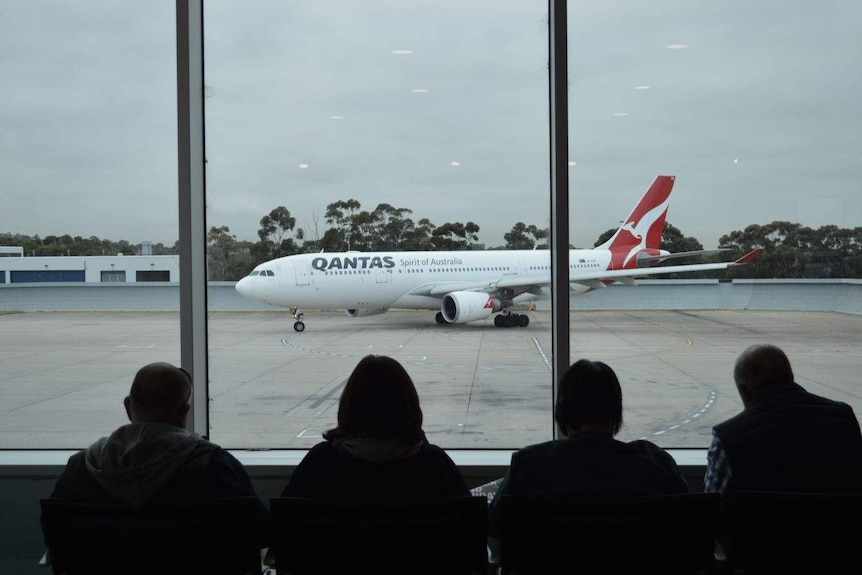 A ban on flights from India makes Indian-Australians feel unfairly singled out.( ABC News: Natasha Johnson )
A ban on flights from India makes Indian-Australians feel unfairly singled out.( ABC News: Natasha Johnson )
Share
In the past five years, the number of overseas-born migrants from India grew more than any other group in Australia, increasing from 449,000 to 721,000.
Indian residents leapfrogged New Zealand-born and China-born migrants in the 2020 government figures to rank second in the country, behind only those from England.
Despite their increasing numbers and growing political voice, it appears those of Indian origin still do not matter enough in the mainstream Australian public sphere.
This is most apparent in the recent travel ban imposed by the federal government on flights from COVID-ravaged India. Not only are Australian citizens prohibited from entering their own country, they also risk fines of up to $66,000 or five years' jail time if they attempt to do so.
This has left stranded 9,000 Australians who have signalled an interest in returning home, including 650 classified as "vulnerable". Critics have decried the punitive nature of the travel ban as racist.
After attacks, a stronger voice
People of Indian descent have long experienced discrimination and racism in Australia.
In 2009–10, a series of savage attacks on Indian students in Melbourne shook the community and resulted in widespread protests, blanket coverage in the Indian media and plummeting student enrolment numbers.
The racially motivated attacks were significant enough to force the Australian government to apologise and compel then-Prime Minister Kevin Rudd to mend diplomatic relations by making a visit to India and setting up the Australia India Institute.
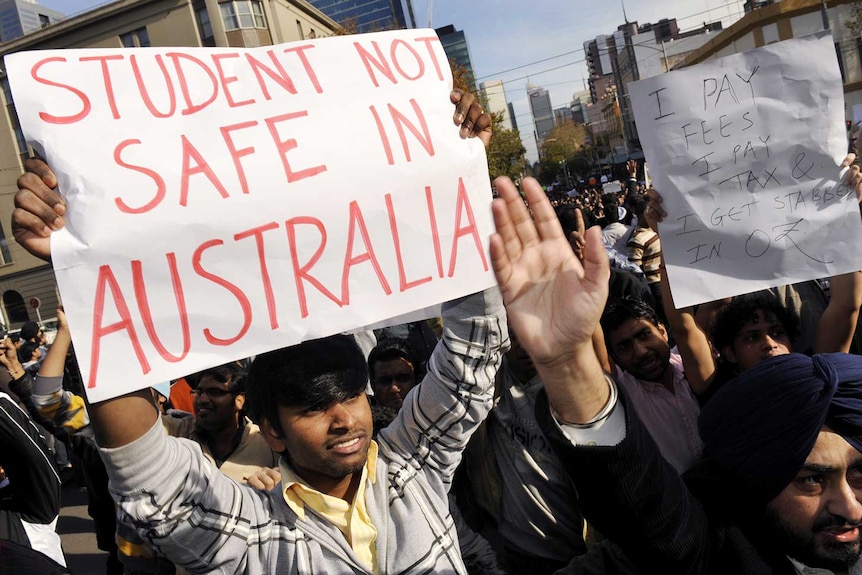 Thousands of Indian students and supporters attended a protest rally in Melbourne in May 2009, as Australia scrambled to contain outrage over a wave of attacks( AFP: William West )
Thousands of Indian students and supporters attended a protest rally in Melbourne in May 2009, as Australia scrambled to contain outrage over a wave of attacks( AFP: William West )
It was widely thought at the time that Rudd did so to rescue the Australian higher education industry, which had become increasingly reliant on international students from India.
In 2013, my colleagues and I organised the first conference of the Indian diaspora in Australia. This was in response to an Australia India Institute report in the wake of the student attacks, which found the Indian-Australian community was not politically active and "flying under the radar".
My research on the attacks showed the Indian-Australian community had in fact transformed from being "de-wogged migrants" to "rabble rousers". This means that due to India's greater economic strength on the global stage, those migrating to other countries have higher levels of pride in their home country. This, in turn, makes them more likely to speak up against perceived discrimination in Australia.
Why do Indian-Australians feel singled out now?
The current crisis over Australian residents being stranded in India has not elicited a similar reaction from the government.
Even though the nation's chief medical officer has warned Australians could die during the travel ban — and doctors, human rights groups and the Indian-Australian community have forcefully criticised the move — Prime Minister Scott Morrison has stood firm.
How can such a decision be explained? Some commentators have said the government is trying to deflect attention from the failures of its own quarantine system by introducing such a punitive measure on health grounds.
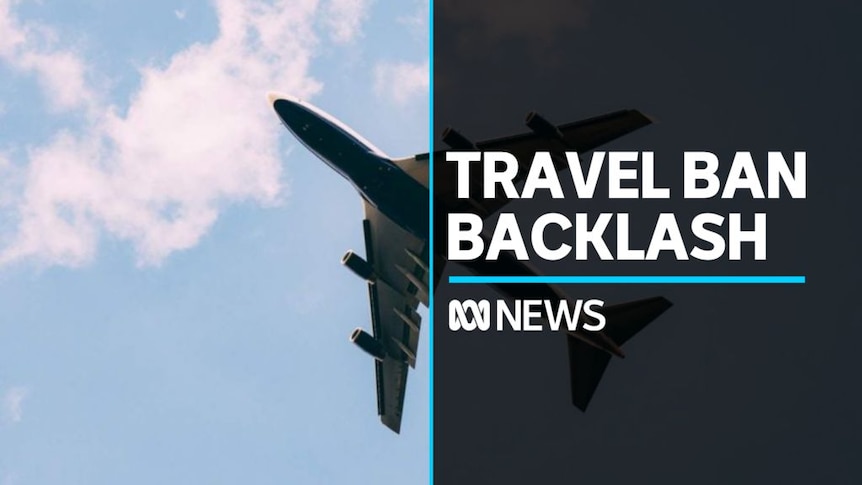 Government move to criminalise Aussies returning from India deemed 'racist'
Government move to criminalise Aussies returning from India deemed 'racist'
The real question is why those flying from India are being singled out. Such drastic steps were not in place when the US, the UK and Europe were going through similarly deadly and infectious COVID outbreaks in the past year.
One possible explanation is the Indian community in Australia is simply an easy target, especially when India is in an unprecedented crisis. Indian officials and media are likely to be preoccupied with more pressing domestic matters and may not complain about the treatment of Indian-Australians the way they did during the student attacks a decade ago.
And despite the Indian-Australian community growing in size in Australia and being increasingly represented in the media and politics, it appears those of Indian origin are still largely perceived as an "other" or a "model minority".
Indian-Australians and their allies have more platforms than ever to express their legitimate anger over the travel ban, but that doesn't mean those in power are listening.
How the Indian community can amplify its voice
On the one hand, the Australian government ought to have learned the lessons of the Melbourne student attacks and should take the lead in changing negative perceptions of its multicultural communities.
This is more important than ever with the rise of racist incidents towards Asian people since the onset of COVID.
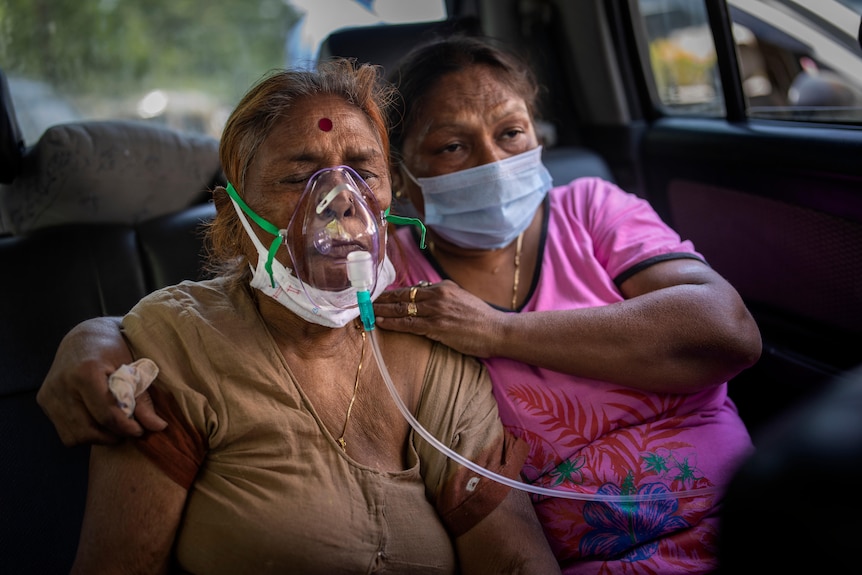 India is experiencing a humanitarian crisis due to record-high COVID cases.( AP: Altaf Qadri )
India is experiencing a humanitarian crisis due to record-high COVID cases.( AP: Altaf Qadri )
Even before the pandemic, those of Indian heritage living in Australia reported experiencing high levels of "subtle racism" in their everyday lives. Anecdotally, this can range from being told to "go back to where you came from" in public places, to being asked to prove one's worth and qualifications when carrying out jobs that are not regarded as stereotypically "Indian".
On the other hand, there is still more the Indian diaspora could do to have a political voice that is taken seriously in times of crisis. This is not just about speaking up for one's own interests through formal political representation. A political voice can be achieved in other ways, such as
 Human rights lawyer Geoffrey Robertson says the India travel ban violates an essential 'privilege of citizenship'.
Human rights lawyer Geoffrey Robertson says the India travel ban violates an essential 'privilege of citizenship'.
While there is more work to be done by the Indian diaspora in Australia to be politically proactive, it does not absolve elected leaders of the responsibility they owe to all Australian citizens to protect them. Migrants report increased feelings of belonging and civic engagement when they feel cared for.
Sukhmani Khorana is a senior research fellow at Western Sydney University. This piece first appeared on The Conversation.
Posted 11h
The real question is why those flying from India are being singled out
Share
In the past five years, the number of overseas-born migrants from India grew more than any other group in Australia, increasing from 449,000 to 721,000.
Indian residents leapfrogged New Zealand-born and China-born migrants in the 2020 government figures to rank second in the country, behind only those from England.
Despite their increasing numbers and growing political voice, it appears those of Indian origin still do not matter enough in the mainstream Australian public sphere.
This is most apparent in the recent travel ban imposed by the federal government on flights from COVID-ravaged India. Not only are Australian citizens prohibited from entering their own country, they also risk fines of up to $66,000 or five years' jail time if they attempt to do so.
This has left stranded 9,000 Australians who have signalled an interest in returning home, including 650 classified as "vulnerable". Critics have decried the punitive nature of the travel ban as racist.
After attacks, a stronger voice
People of Indian descent have long experienced discrimination and racism in Australia.
In 2009–10, a series of savage attacks on Indian students in Melbourne shook the community and resulted in widespread protests, blanket coverage in the Indian media and plummeting student enrolment numbers.
The racially motivated attacks were significant enough to force the Australian government to apologise and compel then-Prime Minister Kevin Rudd to mend diplomatic relations by making a visit to India and setting up the Australia India Institute.
It was widely thought at the time that Rudd did so to rescue the Australian higher education industry, which had become increasingly reliant on international students from India.
In 2013, my colleagues and I organised the first conference of the Indian diaspora in Australia. This was in response to an Australia India Institute report in the wake of the student attacks, which found the Indian-Australian community was not politically active and "flying under the radar".
My research on the attacks showed the Indian-Australian community had in fact transformed from being "de-wogged migrants" to "rabble rousers". This means that due to India's greater economic strength on the global stage, those migrating to other countries have higher levels of pride in their home country. This, in turn, makes them more likely to speak up against perceived discrimination in Australia.
Why do Indian-Australians feel singled out now?
The current crisis over Australian residents being stranded in India has not elicited a similar reaction from the government.
Even though the nation's chief medical officer has warned Australians could die during the travel ban — and doctors, human rights groups and the Indian-Australian community have forcefully criticised the move — Prime Minister Scott Morrison has stood firm.
How can such a decision be explained? Some commentators have said the government is trying to deflect attention from the failures of its own quarantine system by introducing such a punitive measure on health grounds.
The real question is why those flying from India are being singled out. Such drastic steps were not in place when the US, the UK and Europe were going through similarly deadly and infectious COVID outbreaks in the past year.
One possible explanation is the Indian community in Australia is simply an easy target, especially when India is in an unprecedented crisis. Indian officials and media are likely to be preoccupied with more pressing domestic matters and may not complain about the treatment of Indian-Australians the way they did during the student attacks a decade ago.
And despite the Indian-Australian community growing in size in Australia and being increasingly represented in the media and politics, it appears those of Indian origin are still largely perceived as an "other" or a "model minority".
Indian-Australians and their allies have more platforms than ever to express their legitimate anger over the travel ban, but that doesn't mean those in power are listening.
How the Indian community can amplify its voice
On the one hand, the Australian government ought to have learned the lessons of the Melbourne student attacks and should take the lead in changing negative perceptions of its multicultural communities.
This is more important than ever with the rise of racist incidents towards Asian people since the onset of COVID.
Even before the pandemic, those of Indian heritage living in Australia reported experiencing high levels of "subtle racism" in their everyday lives. Anecdotally, this can range from being told to "go back to where you came from" in public places, to being asked to prove one's worth and qualifications when carrying out jobs that are not regarded as stereotypically "Indian".
On the other hand, there is still more the Indian diaspora could do to have a political voice that is taken seriously in times of crisis. This is not just about speaking up for one's own interests through formal political representation. A political voice can be achieved in other ways, such as
- listening to the voices and concerns of their younger generations and encouraging them to speak out in appropriate public forums
- showing solidarity with other communities that are subject to racism and discrimination
- using community groups to work constructively with politicians.
While there is more work to be done by the Indian diaspora in Australia to be politically proactive, it does not absolve elected leaders of the responsibility they owe to all Australian citizens to protect them. Migrants report increased feelings of belonging and civic engagement when they feel cared for.
Sukhmani Khorana is a senior research fellow at Western Sydney University. This piece first appeared on The Conversation.
Posted 11h
All these fucking shitskins must be shot.
Filthy shit skins are not welcome. Fuck your Indian cunt
Filthy shit skins are not welcome. Fuck your Indian cunt
They can go serve out quarantine at Christmas Island
Lawence wong has started blaming sinkiesOnce this Indian Covid strain explode x break loose here, who is to be blamed????
Similar threads
- Replies
- 1
- Views
- 286
- Replies
- 1
- Views
- 417
- Replies
- 10
- Views
- 761



